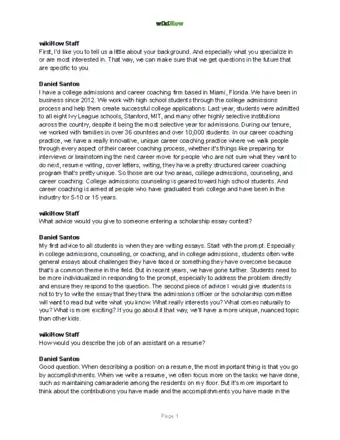This article was co-authored by Daniel Santos. Daniel Santos is a College Admissions & Career Coach and Prepory's co-founder and CEO. Prepory is a leading college admissions consulting firm that has guided over 9,000 students from 35 countries through the US college admissions process. Prepory is a member of the National Association for College Admissions Counseling and a trusted admissions counseling partner to several competitive high schools across Florida. Prior to founding Prepory, Daniel worked at various leading law firms and the United States House of Representatives. Daniel has been featured as a college admissions and career coaching expert across several major publications, including the Wall Street Journal, FORTUNE, and The Harvard Crimson.
This article has been viewed 19,373 times.
From sports to clubs to outside organizations like churches, volunteer work, and even part-time jobs, there is no shortage of activities to take part in outside the classroom. This can make choosing one a little overwhelming. Fortunately, it becomes quite easy once you figure out what you enjoy doing in general. From there, it’s simply a matter of making a list and researching your options. With a little more careful thought, you can also choose an activity that not only interests you, but will bolster your college and/or job applications.
Steps
Figuring out Your Priorities
-
1Think about your interests. Before you start considering specific activities, take a step back. Think about what excites you. Find your passion or passions. Use those to decide on activities that will keep you interested for a long time.[1] Ask yourself:[2]
- How do I spend my free time? Reading? Writing? Playing sports or musical instruments? Dreaming about visiting France?
- What section of the bookstore or library do I always end up in? Sports? Science? Travel?
- What makes me feel satisfied and accomplished? Helping others? Organizing events? Being an important part of a team?
-
2Identify your strengths. Now that you have a better idea of what you like to do in general, pinpoint those that you excel at. Ask yourself what skills they showcase. Then find activities that require the same ones. Guarantee that you will enjoy yourself by choosing an activity that lets you shine. These may include:[3]
- Mental skills (such as continued learning and applied knowledge), which are used in things like math, science, and chess.
- Physical fitness and motor skills (like balance, coordination, and stamina). These are needed for activities like sports and dance.
- Social skills (such as communication, leadership, and teamwork). These can be found in team sports as well as other group projects, like the school paper or yearbook.
Advertisement -
3Think about skills you want to develop. In addition to your strengths, identify what you would like to improve about yourself. Use activities as a way to round yourself out. Seek out new challenges, without the added stress of having to earn good grades at them.[4]
- You can use activities to develop general skills that you may lack. For example, if you feel like your social skills could use improvement, look for activities that involve team projects and strong communication, like theater or team sports.
- You can also apply your current skillset toward building new talents. For instance, if you have a history of playing aggressive sports that have taught you to be assertive, consider other activities that demand the same self-confidence, like the debate club.
Finding Activities
-
1Plan for the year ahead. If possible, begin your search well before the new school year. Give yourself plenty of time to meet any requirements. These may include:
- Fees you have to pay in order to join or use equipment. [5] Private music lessons will charge you for each session, for instance, while the school band may charge you a rental fee if you don't have your own instrument.
- Whether any travel is involved. Say you join the swim team, but they practice off-campus at a private pool. Is transportation provided by the school, or do you have to get there on your own?
- What grade point average (GPA) is required for you to be eligible. To participate in school activities, you will most likely need to maintain passing grades.
- Whether new members are welcome at any time, or if they have to apply by a certain deadline. Many team sports will have try-outs, for instance. Volunteer groups, on the other hand, will probably welcome you at any time of year.
-
2Find out what activities are available. Search your school’s website for a complete list of all the sports, clubs, and organizations that it provides. Also look for calendar details, such as start- and end-dates, plus event schedules, to make sure it won't get in the way of anything else going on in your life. If the website seems incomplete, talk with your guidance counselor or adviser. Also look for other organizations in your community, such as:[6]
-
3Look into each one. Once you have a list of activities that match your interests, do a little research so you have a better idea of what to expect. Make certain that you are comfortable with the level of commitment they expect from you. Also make sure that their culture is a good match for your own personality. For instance, with team sports, do they practice good sportsmanship or a win-at-all-costs attitude? Whatever the activity is, make sure the people involved will be a good fit for you personally.[10]
- Visit their website or social media pages if they have any.
- Speak with current and former members for their personal take.
- Ask to sit in on meetings or practices to observe them in action.
Making Smart Choices for the Future
-
1Think ahead. Whether you’re in college, high school, or lower, think about the future. Consider your goals beyond graduation. Then think about how your current activities will reflect on you in light of those goals.
- If you’re planning on applying to college or grad school, expect admission boards to look for long-term commitment. Only join a couple of activities. Stick with them year after year. Don't jump from one to the next every month or two.
- If you’re entering the workforce after graduation, think about how the experiences offered by each activity could strengthen your resume.[11] Planning a food drive in school, for example, can demonstrate initiative, leadership, and organizational skills, which most employers will be looking for.
-
2Look for leadership opportunities. Find out which activities promote advancement. Stand out from the crowd. Choose activities that will highlight your commitment by seeking more prominent positions and responsibilities.[12]
- Leadership roles aren't restricted to titles like “captain” or “treasurer.” Volunteering to take on extra responsibilities is a great way to set yourself apart from other people who do the bare minimum. Evaluate each activity by how much room there is for personal initiative.
- For example, Sally might have been elected vice-president of your National Honor Society based on popularity. But your NHS adviser will undoubtedly write you a glowing recommendation if you're always the first one to volunteer for extra work that needs to be done.
-
3Sample early, then narrow down. Remember: just because something looks great on paper doesn’t guarantee that it will really be all that great for you personally. Don’t be afraid of trial-and-error at first. Use your freshman and sophomore years to explore your options. Once you have a firmer idea of what this or that activity actually involves, decide which one(s) you want to stick with.
- First and foremost, base your decision on whether you or not you truly enjoy this activity. If you love French in general, but start dreading each meeting of your school's French club, choose something else.
- If you're in college, figure out ways to complement your major.[13] For example, if you're a zoology major, think about volunteering at an animal shelter.
- For high schoolers considering college, don’t worry about the subject matter. Admission boards are less concerned with the subject and more interested in your commitment to it. While you would likely join the A/V club if you're aiming to become a cameraman, this doesn't need to be your career goal; just be sure to stick with A/V club even if your intended major is completely unrelated.
Expert Q&A
-
QuestionWhat are impressive extracurriculars?
 Daniel SantosDaniel Santos is a College Admissions & Career Coach and Prepory's co-founder and CEO. Prepory is a leading college admissions consulting firm that has guided over 9,000 students from 35 countries through the US college admissions process. Prepory is a member of the National Association for College Admissions Counseling and a trusted admissions counseling partner to several competitive high schools across Florida. Prior to founding Prepory, Daniel worked at various leading law firms and the United States House of Representatives. Daniel has been featured as a college admissions and career coaching expert across several major publications, including the Wall Street Journal, FORTUNE, and The Harvard Crimson.
Daniel SantosDaniel Santos is a College Admissions & Career Coach and Prepory's co-founder and CEO. Prepory is a leading college admissions consulting firm that has guided over 9,000 students from 35 countries through the US college admissions process. Prepory is a member of the National Association for College Admissions Counseling and a trusted admissions counseling partner to several competitive high schools across Florida. Prior to founding Prepory, Daniel worked at various leading law firms and the United States House of Representatives. Daniel has been featured as a college admissions and career coaching expert across several major publications, including the Wall Street Journal, FORTUNE, and The Harvard Crimson.
College Admissions & Career Coach Participate in activities where there is some type of regional/state/county level of involvement. Things like Model UN are really wonderful, along with speech and debate organizations where you can compete with students outside your area. Extracurriculars like National Honor Society just don't sound as impressive to college admissions committees, since most academically competitive students participate in them.
Participate in activities where there is some type of regional/state/county level of involvement. Things like Model UN are really wonderful, along with speech and debate organizations where you can compete with students outside your area. Extracurriculars like National Honor Society just don't sound as impressive to college admissions committees, since most academically competitive students participate in them.
Warnings
- Always prioritize regular schoolwork over activities. Remember: extracurricular activities are "extra," so don't join any that will make your schoolwork suffer.⧼thumbs_response⧽
Expert Interview

Thanks for reading our article! If you'd like to learn more about extracurricular activities, check out our in-depth interview with Daniel Santos.
References
- ↑ https://www.looksharp.com/blog/how-to-choose-extracurricular-activities-to-get-ahead
- ↑ https://www.themuse.com/advice/5-ways-to-find-your-passion
- ↑ https://www.care.com/c/stories/3184/choosing-an-after-school-activity-for-your-ch/
- ↑ https://www.care.com/c/stories/3184/choosing-an-after-school-activity-for-your-ch/
- ↑ https://www.care.com/c/stories/3184/choosing-an-after-school-activity-for-your-ch/
- ↑ https://www.looksharp.com/blog/how-to-choose-extracurricular-activities-to-get-ahead
- ↑ https://www.universitylanguage.com/blog/27/extracurricular-activities-in-college/
- ↑ https://www.care.com/c/stories/3184/choosing-an-after-school-activity-for-your-ch/
- ↑ http://www.princetonreview.com/college-advice/extracurricular-activities
- ↑ https://www.looksharp.com/blog/how-to-choose-extracurricular-activities-to-get-ahead
- ↑ https://www.looksharp.com/blog/how-to-choose-extracurricular-activities-to-get-ahead
- ↑ https://www.looksharp.com/blog/how-to-choose-extracurricular-activities-to-get-ahead
- ↑ https://www.looksharp.com/blog/how-to-choose-extracurricular-activities-to-get-ahead




































































